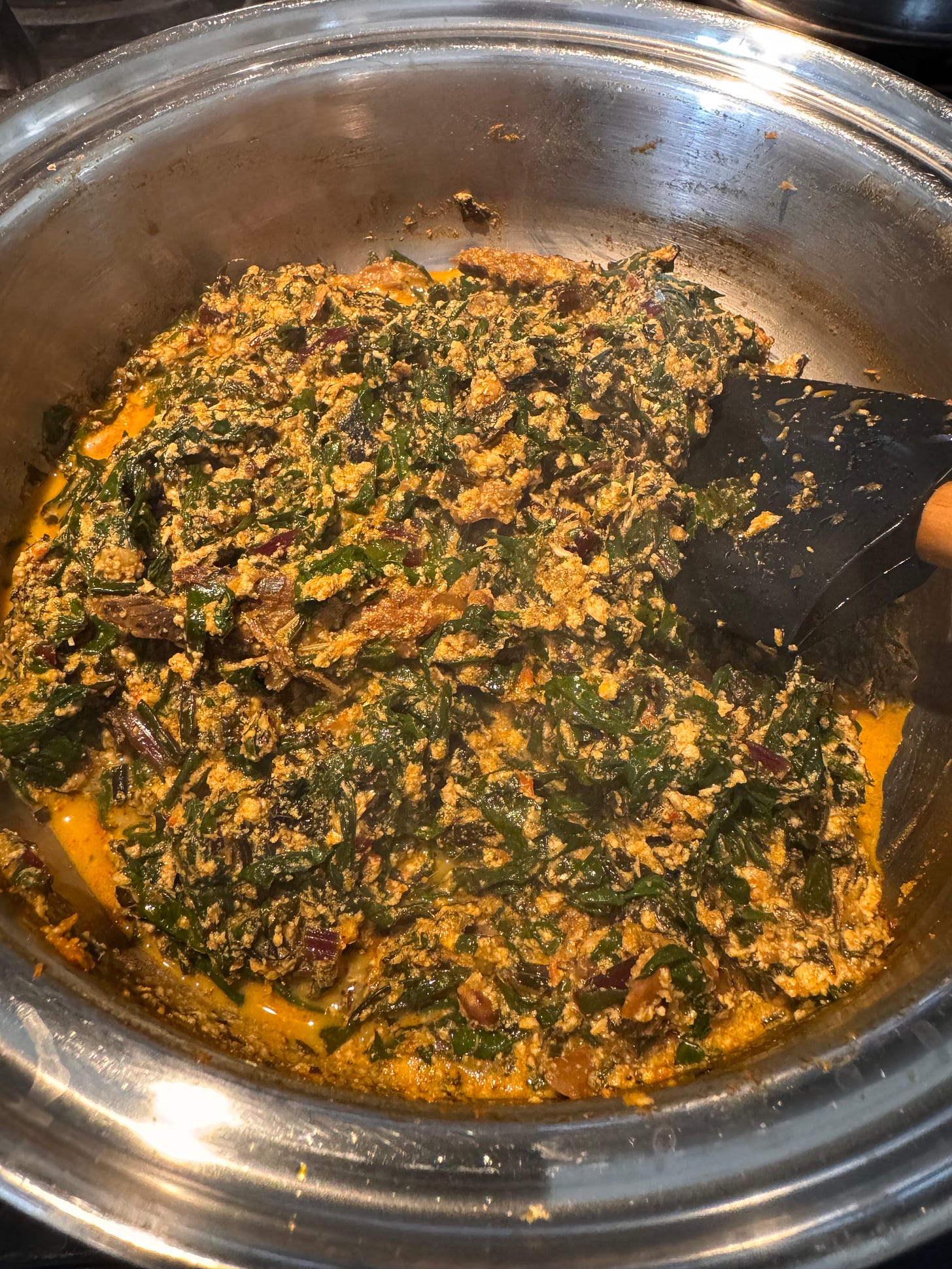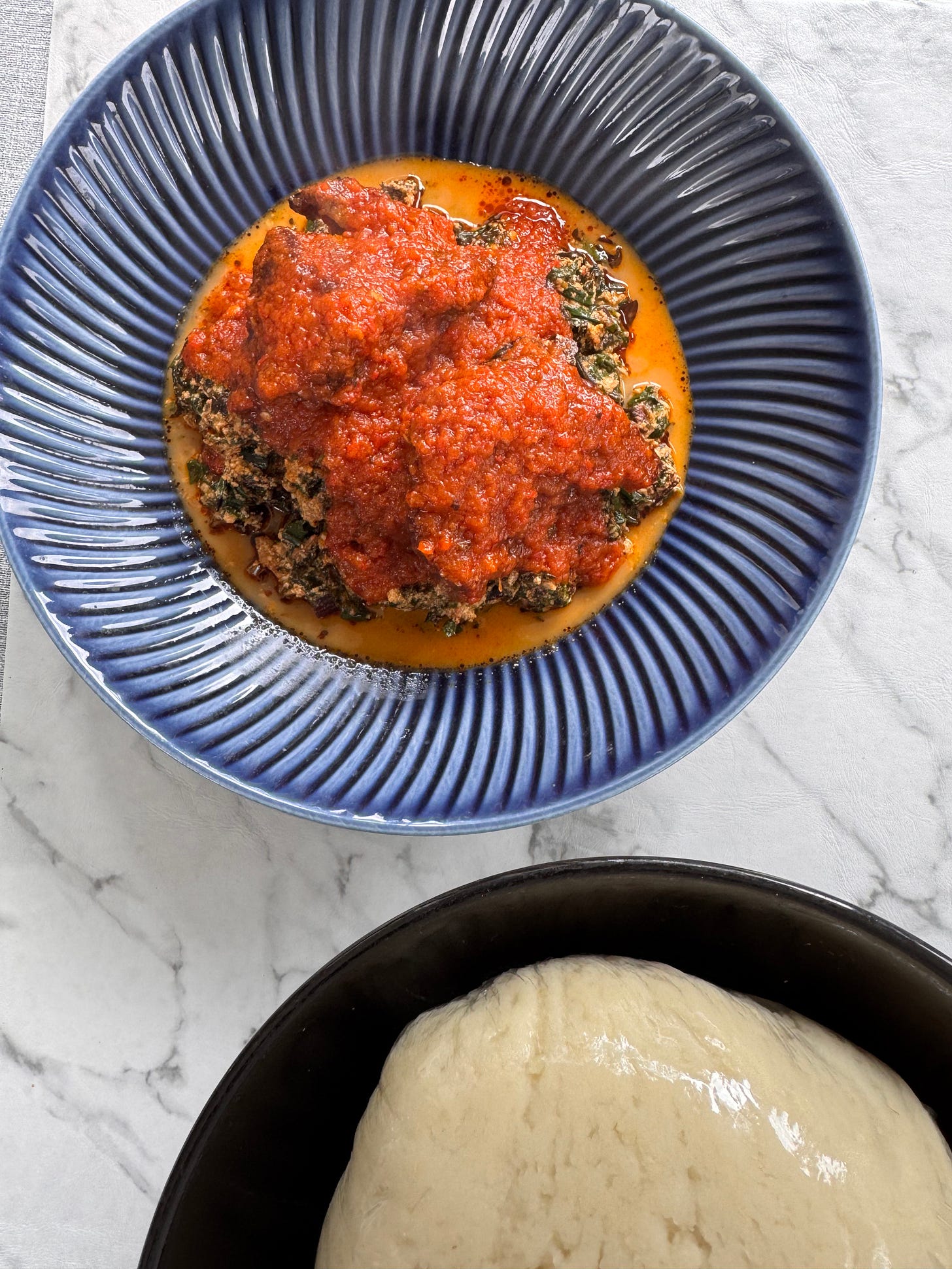Sundays carry a kind of sacred rhythm. The kind that smells of something roasting slowly in the oven, of gravy gently simmering, of family laughter echoing from kitchen to table, side-stepping topics that could be upsetting for some and catching up on each other’s week.
In Britain, that often means a proper Sunday roast – beef, lamb, chicken or a vegetarian alternative, nestled next to roast potatoes, vegetables, and Yorkshire puddings. But every so often, my Sundays take a detour straight back to Nigeria.
Today was one of those days. I’d picked up some butterflied lamb breast earlier in the week, with full intentions of a either a classic British roast or one-pot Middle Eastern rice dish I’d had on my mind with the lamb falling apart with the barest of touches.
That plan quickly dissolved when I stopped at an Asian food store on my way back from South Manchester Food Festival and spotted bundles of fresh beetroot, their deep purple bulbs barely distracting me from the crisp, leafy greens still clinging to them. Beetroot leaves which are often overlooked and usually discarded immediately sparked a memory. A longing.
In Nigeria, Sundays often mean pounded yam served with rich soups: Egusi, Ogbono, Efo Riro, Afang. My mum’s pounded yam, stretchy and smooth, pounded in the traditional mortar and pestle, could melt anyone’s stress away.
I haven’t pounded yam by hand in over three decades; nowadays, my Thermomix gives me a piping hot mound in under 40 seconds. A small win for modern convenience, yet every bite still tastes like home.
So, I caved in and pivoted. I cooked the lamb with fresh rosemary, thyme, onions, garlic and ginger seasoned with sea salt until tender, then I placed the meet under my grill to get some colour and the closest I can get to frying it in oil which is the authentic way.
I reintroduced the meat to a pepper sauce I’d already made from a blend of pointed red peppers, scotch bonnets, onions, and garlic that were roasted and blitzed to smoky, velvety perfection. That base is a flavour bomb that works across continents. Instead of roasting the lamb, I let it cook gently in the sauce, soaking in all its richness.
And those beetroot leaves? They became the heart of my Egusi soup. Traditionally, Egusi (ground melon seeds) are blended and stirred into a bubbling, seasoned blended pepper-based broth until they form soft, fluffy clouds that float among the greens and meats. The Egusi becomes thickened in the sauce.
In Nigeria, we’d use fluted pumpkin leaves (Ugu), bitterleaf, or waterleaf. But here in the UK, I adapt. I’ve used spinach, kale, collard greens, curly kale and even Swiss chard.
Each vegetable has its quirks: spinach wilts into nothingness and brings a lot of water to the table, so it needs a good squeeze before it goes in the pot. Usually, I add some coarse sea salt and rub the spinach leaves with the salt creating friction that breaks it down allowing me to get rid of the excess water. I rinse the spinach a few times to get the saltiness out and squeeze the daylight out of them.
Kale, on the other hand, is tough and needs blanching to soften it just enough to mimic Ugu’s gentle bite. Beetroot leaves sit somewhere in the middle; earthy, tender but structured. With a handful of dried bitter-leaf and some rehydrated Ugu from my Nigerian pantry that pot became a blend of old and new. The end result was both familiar and fresh.
The Egusi soup itself is comfort in a bowl. The palm oil sizzled in the pan, perfuming the kitchen with that unmistakable aroma. In went onions, crayfish, a little ground pepper, the Egusi paste (just melon seeds ground and mixed with water), and the greens, simmering into a golden, thick stew. It’s the kind of dish that hugs you from the inside, that makes you close your eyes with every mouthful and forget the weather, the week, the world. Just you and your fingers creating another memory of a proper ‘happy meal’.
This is my kind of Sunday roast; a Nigerian roast with a twist. No Yorkshire puds, but a cloud of pounded yam. No gravy, but Egusi, golden and fragrant. The lamb? Tender and rich in velvety oven-roasted peppers based sauce. It’s not fusion for the sake of novelty; it’s memory meeting creativity. It’s Knitting Flavours and exactly how I like to cook.
And here’s the dilemma: living abroad means making peace with substitutions. It means learning that kale can stand in for Ugu, that frozen spinach can be tamed, that beetroot leaves can surprise you. It means carrying your grandmother’s voice in your head as you stir, while using tools she never had. It means choosing nostalgia and seasoning it with what’s available.
So no, today I didn’t have a “proper” roast whatever that even means. But I had Sunday dinner that is real, rooted, and delicious. And maybe next week, I’ll circle back to that Middle Eastern rice idea. Or maybe not. Who knows what ingredient will catch my eyes over the next few days.
If you’ve never tried Egusi soup, imagine a stew that’s nutty, savoury, rich, and full of texture. Think of the best bits of ground almonds, soft cheese curds, and tender greens, all nestled in a warming broth that makes you feel like someone who loves you made it just for you.
As for the lamb breast; trust me, once you’ve tasted it in an oven-roasted pepper sauce, the idea of mint jelly will feel like a distant whisper.
Next Sunday, make a different kind of roast. Try something that makes you feel daring. Swap the beef for lamb in a pepper sauce. Trade the potatoes for pounded yam or rice. Let a new memory simmer. If you’ve got questions about how to make Egusi, how to cook with beetroot leaves, or what to pair with your Sunday lamb, I’m here. Just ask.
Remember, “Home isn’t always a place. Sometimes it’s a taste, a smell, a memory stirred back to life with a wooden spoon.”








Thanks for sharing details of how to prepare the "Nigerian Sunday Roast". Indeed, adaptation and creativity are needed where cultures meet!
May God continue to inspire you.